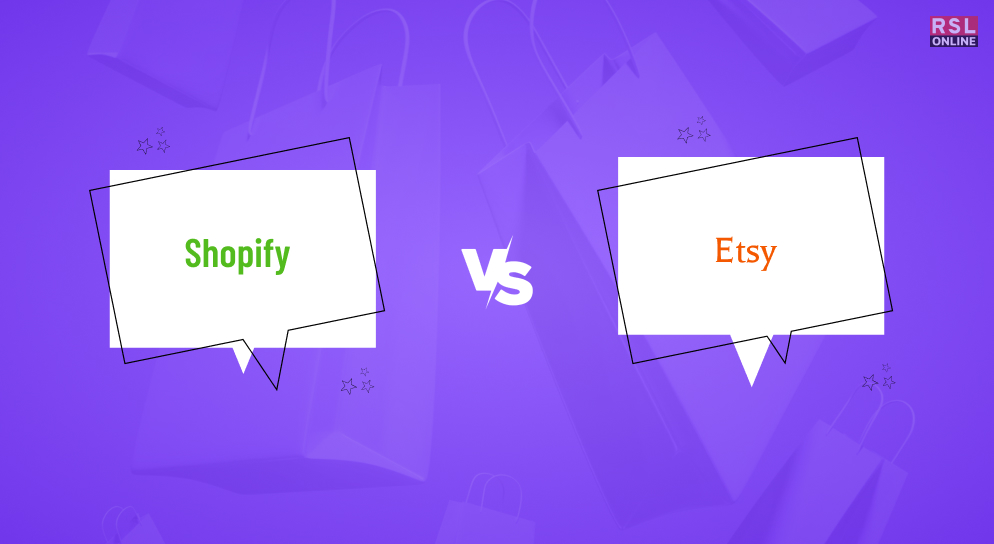If you’re thinking of starting or growing your online business in 2024, you might be wondering which platform to choose: Shopify vs Etsy. Both are popular and powerful e-commerce platforms that can help you sell your products and services to millions of customers around the world. But which one is better for your business?
Shopify and Etsy have different features, benefits, drawbacks, and costs that you should consider before making a decision. In this article, I’ll compare Shopify and Etsy in terms of several parameters. These include the kind of products you can sell to how you can market and promote your online store on each platform.
So, if that is something that you want to know, I have you covered! So, keep on reading till the end to learn more…
Etsy vs Shopify: The Ultimate Showdown!
Hey there, budding entrepreneurs and business aficionados! So, you’ve got that fantastic product ready to conquer the world, but now comes the tricky part – choosing the right platform to showcase your brilliance. Two heavyweights stand out in the vast digital marketplace: Shopify and Etsy.
It’s like choosing between a sleek city apartment and a cozy cottage in the woods. Let’s embark on a journey to figure out which one is the perfect match for your business in 2024.
Etsy, the artisan’s haven, is like a bustling marketplace filled with handcrafted wonders and unique finds. Setting up shop here is as easy as weaving a tapestry – it’s all about showcasing your creativity. Is Etsy legit, you ask? Absolutely. It’s the OG artisan’s playground, and buyers know it. Trust, my friend, is the key currency here.
Now, let’s hop over to Shopify, the all-encompassing digital bazaar. If Etsy is your cozy cottage, Shopify is the tech-savvy penthouse. It’s not just a platform; it’s a lifestyle. Is Shopify legit? You bet. With Shopify experts and a global reach, it’s the go-to for businesses eyeing world domination.
So which one of these two is the best?
By the end of this article, you’ll have a clear idea of which platform is best for your business: Shopify or Etsy. Let’s get started!
What Kind of Products Can You Sell on Shopify and Etsy?
The first thing you should consider when choosing between Shopify and Etsy is what kind of products you can sell on each platform. This will determine how suitable each platform is for your business and how much potential you have to reach your target audience.
Shopify is a general e-commerce platform that allows you to sell almost anything you want, as long as it’s legal and complies with Shopify’s terms of service. You can sell physical products, digital products, services, subscriptions, memberships, and more. You can also sell products from different niches, categories, and industries, such as fashion, beauty, electronics, home, art, etc.
Etsy is a niche e-commerce platform focusing on handmade, vintage, and craft supplies. You can sell physical products handmade by you or someone else, vintage products at least 20 years old, and craft supplies used to make handmade products. You can also sell digital products that are related to these categories, such as patterns, printables, etc.
As you can see, Shopify and Etsy have different product restrictions and requirements. Shopify is more flexible and versatile, making it a great place to earn money. On the other hand, Etsy is more specific and niche. Depending on what kind of products you want to sell, you might find one platform more suitable than the other.
For example, if you want to sell handmade jewelry, you can use both Shopify and Etsy, but you might have more exposure and credibility on Etsy since it’s known for handmade products. On the other hand, if you want to sell electronics, you can only use Shopify since Etsy doesn’t allow them.
How Easy Is It to Set Up and Manage Your Online Store on Shopify and Etsy?
The next thing you should consider when choosing between Shopify and Etsy is how easy it is to set up and manage your online store on each platform. This will determine how much time and effort you have to invest in creating and running your online business.
Shopify stands out as a comprehensive, hosted e-commerce platform that simplifies the process of creating and managing your online store. It encompasses all the essentials, from domain name registration to web hosting, shopping cart functionalities, and secure payment gateways.
The beauty of Shopify lies in its accessibility, requiring no technical prowess or coding know-how. Its user-friendly interface and drag-and-drop editor empower users to customize their stores effortlessly.
On the flip side, Etsy operates as an e-commerce marketplace, connecting sellers with buyers seeking handmade, vintage, and craft supplies. Etsy takes the hassle out of technical aspects like domain management, web hosting, and payment gateways, providing a seamless experience. Similar to Shopify, Etsy boasts a user-friendly interface, ensuring that even those without technical skills can easily create and manage their stores.
While both platforms cater to the tech novice, nuances exist in how you shape your online presence. Shopify grants more control and flexibility, allowing domain selection, customizable layouts, and the addition of various features and apps. However, this autonomy comes with added responsibilities, including payment for domain names, web hosting, and apps.
Conversely, Etsy offers less control and flexibility, restricting users to the Etsy domain and predetermined store layout. This limited customization, however, comes with reduced responsibilities, as Etsy covers domain names, web hosting, and apps costs. In the Shopify vs Etsy debate, the choice ultimately boils down to the level of control and responsibility you seek in crafting your online store.
How Much Does It Cost to Use Shopify and Etsy, and What Fees Do You Have to Pay?
The third thing you should consider when choosing between Shopify and Etsy is how much it costs to use each platform and what fees you must pay. This will determine your online business’s profitability and how much money you have to invest in it.
Shopify has different pricing plans that you can choose from, depending on your needs and budget. The basic plan costs $29 per month, the standard plan costs $79, and the advanced plan costs $299. Each plan has different features and benefits, such as the number of products, staff accounts, storage space, reports, etc.
Etsy has a free and paid plan that you can choose from, depending on your needs and budget. The free plan allows you to create and manage your online store without any monthly fees. The paid plan, called Etsy Plus, costs $10 monthly and comes with some extra features and benefits, such as listing credits, ad credits, custom URLs, etc.
In addition to the monthly fees, both Shopify and Etsy charge some other fees that you have to pay, such as:
1. Transaction Fees
You must pay these fees for each sale you make on your online store. Shopify charges a transaction fee of 2.9% + 30 cents for online sales and 2.7% for in-person sales unless you use Shopify Payments, which is Shopify’s own payment processor. Etsy charges a transaction fee of 5% for each sale, plus a conversion fee if you sell in a different currency than your own.
2. Listing Fees
You have to pay these fees for each product you list on your online store. Shopify doesn’t charge any listing fees; you can list unlimited products on any plan. Etsy charges a listing fee of 20 cents for each product, which lasts for four months or until the product sells.
3. Payment Processing Fees
You must pay these fees for each payment you receive from your customers. Shopify charges a payment processing fee of 2.9% + 30 cents for online sales and 2.7% for in-person sales if you use Shopify Payments. If you use a third-party payment processor, such as PayPal or Stripe, you must also pay their fees. Etsy charges a payment processing fee of 3% + 25 cents for each payment if you use Etsy Payments. If you use a third-party payment processor, such as PayPal or Stripe, you must also pay their fees.
4. Ad Fees
You must pay these fees for each click you get from your ads on the platform. Shopify doesn’t charge any ad fees, as you can run your own ads on any platform, such as Google, Facebook, Instagram, etc.
Etsy charges an ad fee of 15% for each sale that you make from its offsite ads, which are ads that Etsy runs on other platforms, such as Google, Facebook, Instagram, etc. You can opt out of offsite ads if you make less than $10,000 in sales per year. You can also run your own ads on Etsy, which cost 10 cents to $2 per click, depending on your budget and competition.
As you can see, Shopify and Etsy have different costs and fees that you have to pay. Shopify is more expensive in terms of monthly fees but cheaper in terms of transaction, listing, and ad fees.
Etsy is cheaper in terms of monthly fees but more expensive in terms of transaction, listing, and ad fees. Depending on your sales volume, profit margin, and marketing strategy, you might find one platform more cost-effective than the other.
How Can You Customize and Design Your Online Store on Shopify and Etsy?
The fourth thing you should consider when choosing between Shopify and Etsy is how you can customize and design your online store on each platform. This will determine how attractive and professional your online store will look and how well it will reflect your brand identity and personality.
Shopify allows you to customize and design your online store with much freedom and flexibility. You can choose from hundreds of free and paid themes that suit your niche, style, and preferences.
You can also edit your theme with a drag-and-drop editor that lets you change the colors, fonts, images, layout, etc. Moreover, you can also use HTML and CSS to make more advanced changes to your theme. You can also add features and functionality to your online store with thousands of apps integrating with Shopify.
Etsy allows you to customize and design your online store with some limitations and restrictions. You can choose from a few basic themes that are similar for all sellers. You can also edit your theme with some options that let you change the banner, logo, profile picture, shop title, shop announcement, etc. And lastly, you can’t use HTML
Wrapping It Up!
The Etsy vs. Shopify battle has shown two very different worlds in the vast world of Internet commerce: one is the haven for artisanal businesses, full of charm and community, and the other is a global juggernaut with endless opportunities. It’s up to you to decide whether Shopify’s global gravity or Etsy’s handmade charm captures you.
Every platform has a distinct appeal of its own; Shopify provides a platform for ambitious companies, while Etsy provides a comfortable refuge for creativity. Is Etsy inferior to Shopify? It is dependent upon your goals and digital destiny. Your digital footprint will be seen in the landscape of 2024, and your choice between Shopify and Etsy will determine the direction of your online store.
Thus, answer the call, let your imagination run wild, and set out on a digital adventure where each click puts you one step closer to realizing your entrepreneurial goals. Make an informed decision, as having the appropriate platform is essential for success in the e-commerce industry. Choose between Shopify and Etsy to shape your digital future.
Read Also:




























